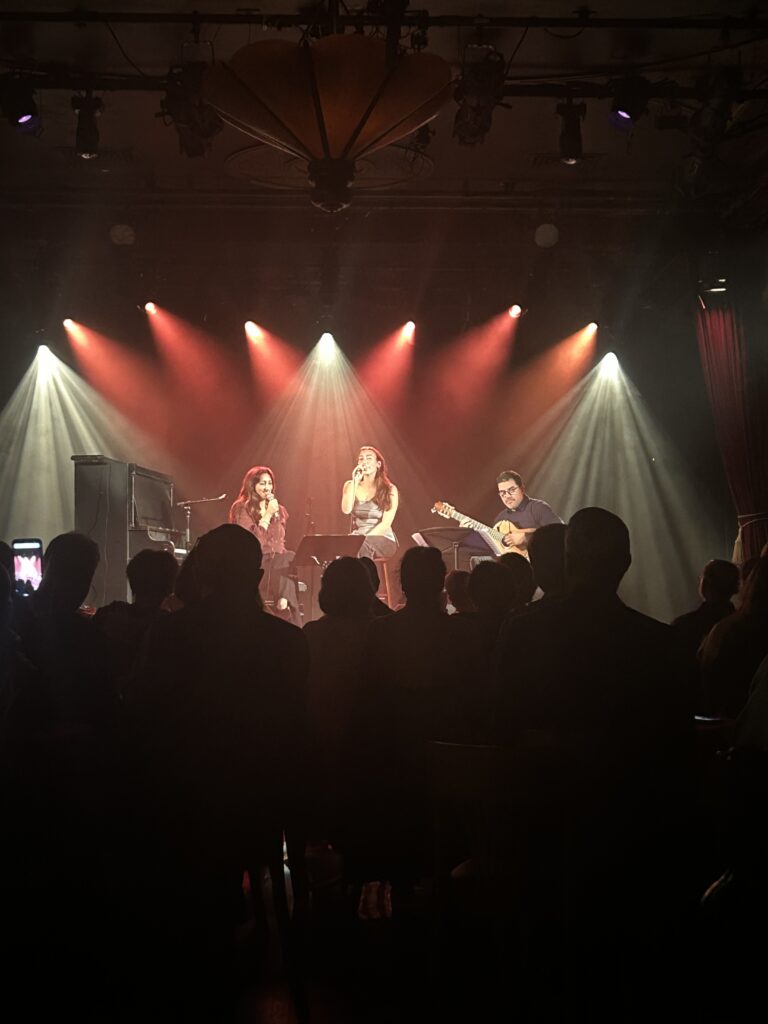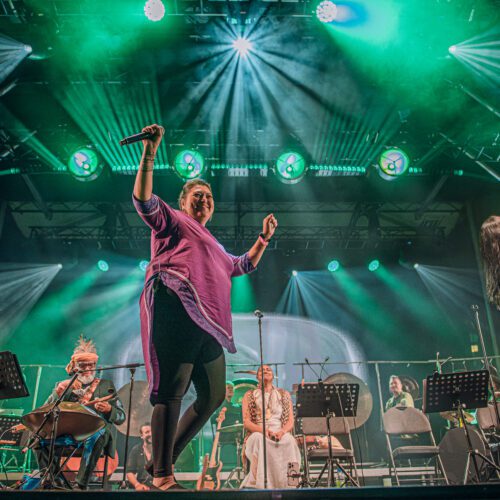After a brief tribute to her mother Natalie Choquette at the start of the show, Florence K plunges us straight into the world of the great bossa nova master, Antônio Carlos Jobim, accompanied by her excellent guitarist and composer Carlos Jimenez, who recently earned a Doctorate in Music.
From the very first track, Água de Beber, the atmosphere in the room relaxes, she plays a few notes on the piano and even gets the audience, familiar with this classic, to sing along. “I’m always afraid of being unmasked in my complex by speaking Portuguese, a bit like the impostor syndrome,” she confesses between songs, quoting Freud. Indeed, she makes several allusions to psychology during the show (her doctoral studies in psychology surely have something to do with it), but she also takes the time to explain the context of each song, with a touch of humor much appreciated by the audience. She does this with Vivo sonhando and Desafinado, two Jobim classics. She also exchanges with her guitarist on several occasions, inviting him to reveal himself in turn, but to no avail.
Making an effort not to cross her legs during the show, it’s especially when she’s playing the piano that she seems completely in her element. She closes her eyes, sometimes sings over her notes, and lets herself go.
She also exchanges with her husband, who was in the audience, in impeccable English, including him in the show, always with the same touch of humor. “When you met me, did you know you were going to suffer all your life?” she asks him, before introducing the song Eu sei que vou te amar.
Drawing a portrait of bossa nova in the 60s, she seems to have done a lot of research in preparing the album “Brésil mon amour” released in 2023, teaching us that Bossa Nova means “New Wave”. She continues with Chega de saudade and Só Danço Samba, again with show-stopping piano passages. “During my 20-year career, I never used a lectern, but now my mental load is such that I no longer have the space to memorize all the songs,” she confides. That said, it in no way detracts from the accuracy of her silky voice, nor from the emotion she conveys to the audience. A highlight of the show was during the song La quiero a Morir, a special request made by an audience member for his wife. The song was far from perfect given the circumstances, but that’s precisely what appealed to the audience. That authenticity. In fact, she suggested to her husband that he should do the same at their next Paul McCartney concert, and the audience erupted in laughter.
Her songs in Spanish were a great crowd-pleaser, especially for my Colombian friend I was with, who wasn’t expecting to hear classics such as Lagrimas negras, among others. Sometimes you get the impression that she’s whispering into the microphone, giving the impression that a veil surrounds her voice.
Sad not to have any “Charles” in the room, before the track Take it easy my brother Charles, she takes the time to thank Nick Petrowski, who produced the album and whose idea it was to include this “intruder” track on the album.
Another highlight was undoubtedly the participation of her 18-year-old daughter Alice Khoriaty on two tracks: Vol de nuit, written at the time of her birth, and Águas de Março, which Jobim sang with Elis Regina. The complicity between mother and daughter was palpable and beautiful, while Carlos did a little percussion on his guitar as he played. So it was a family show on this autumn evening.
She couldn’t end the evening without singing Garota de Ipanema, which the whole room knew, especially the Brazilians sitting in front of the stage. In fact, I spotted the great Brazilian singer Bïa in the room, as well as the team behind the organization of the Journées brésiliennes. “After a 20-year career, it’s nice to know that people still come out to see me perform,” she concludes gratefully.
























